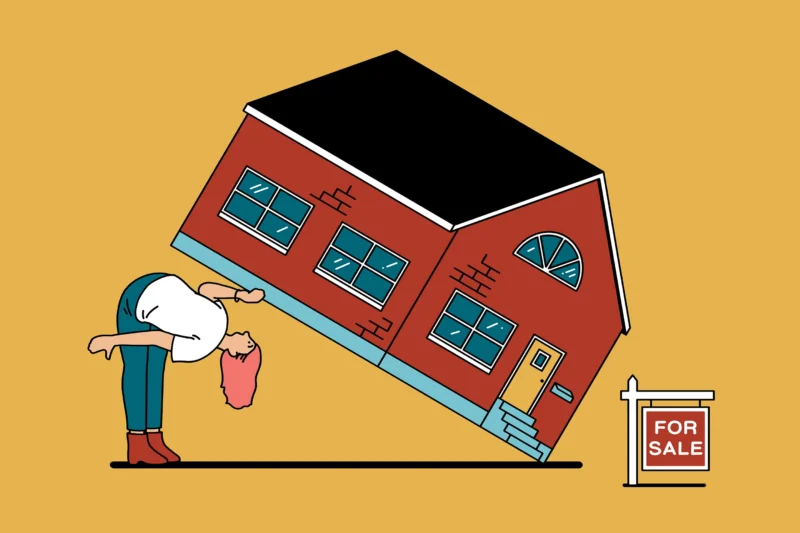Buying a house is a significant investment, and understanding your financial situation is crucial. Before you start house hunting, take a close look at your finances. Calculate your monthly income, existing debts, and expenses to determine how much you can afford. This process involves checking your credit score, which plays a vital role in securing a mortgage. A high credit score can get you better interest rates, while a low score may limit your options.
If your credit score is low, consider improving it before applying for a mortgage. This could mean avoiding loans for bad credit, paying off debts, ensuring timely bill payments, and correcting any errors on your credit report. Understanding your financial situation helps set realistic expectations and prevents you from overcommitting.
Choosing the Right Mortgage

Selecting the right mortgage is another critical step in the home-buying process. There are various types of mortgages available, including fixed-rate, adjustable-rate, and government-backed loans. Each type has its pros and cons, and the right one for you depends on your financial situation and long-term plans. For instance, a fixed-rate mortgage offers stability with consistent payments, while an adjustable-rate mortgage might start with lower payments but can increase over time. Government-backed loans, such as FHA or VA loans, might be more accessible if you qualify. Be sure to shop around and compare offers from multiple lenders to find the best rates and terms. Consulting with a mortgage advisor can also provide valuable insights tailored to your circumstances.
Avoiding Over-Borrowing
One common mistake homebuyers make is over-borrowing. Just because you qualify for a certain loan amount doesn’t mean you should take it all. Borrowing the maximum amount can stretch your finances thin and leave little room for unexpected expenses. It’s essential to consider all costs involved in owning a home, including property taxes, insurance, maintenance, and utilities. A good rule of thumb is to keep your mortgage payment within 25-30% of your monthly income. This ensures you have enough left over for other expenses and savings. By avoiding over-borrowing, you protect yourself from financial strain and potential foreclosure.
Conducting Thorough Inspections

A thorough home inspection is crucial before finalising your purchase. Skipping this step or opting for a quick inspection can lead to costly surprises down the line. Hire a certified home inspector to evaluate the property’s condition, including its structural integrity, electrical systems, plumbing, and more. They can identify potential issues that may not be visible to the untrained eye. If significant problems are discovered, you can negotiate repairs with the seller or reconsider your purchase. Additionally, consider attending the inspection yourself to ask questions and gain a better understanding of the home’s condition. Investing in a thorough inspection can save you from future headaches and expenses.
Considering Future Needs
When buying a house, it’s essential to think about your future needs. Many first-time buyers focus solely on their current situation without considering how their needs might change. For instance, if you plan to start a family, you may need more space or a home in a good school district. Alternatively, if you anticipate changes in your job situation, you might want to consider the home’s location concerning your workplace. Buying a house is a long-term commitment, so it’s important to choose a property that can adapt to your changing lifestyle. Consider factors like the number of bedrooms, neighbourhood amenities, and potential for future expansion. Planning for the future ensures that your new home will meet your needs for years to come.
Budgeting for Closing Costs

Many homebuyers overlook closing costs, which can add up to 2-5% of the home’s purchase price. These costs include fees for the mortgage application, appraisal, title search, and insurance, among others. Failing to budget for these expenses can lead to financial strain at the last minute. It’s essential to get a clear estimate of your closing costs early in the home-buying process. Your lender should provide a Loan Estimate, which outlines these costs. Be sure to save enough to cover them without depleting your emergency fund. Properly budgeting for closing costs ensures a smoother transaction and prevents last-minute financial stress.
Securing a mortgage can be challenging if you have bad credit, but it’s not impossible. Loans for bad credit, such as FHA loans, offer more lenient requirements for borrowers with lower credit scores. These loans might have higher interest rates, so it’s essential to compare offers from different lenders to find the best terms. Additionally, consider working with a mortgage broker who specializes in loans for bad credit. They can help you navigate the process and find suitable options. Improving your credit score before applying can also enhance your chances of approval and secure better rates. Understanding your options and preparing in advance can make buying a house with bad credit more feasible.
Understanding the Market
Understanding the real estate market is crucial for making an informed purchase. Market conditions can influence property prices, the availability of homes, and the level of competition among buyers. Research the local market trends, including average home prices, the length of time homes stay on the market, and the number of homes for sale. This information can help you make a competitive offer and avoid overpaying. Additionally, consider working with a local real estate agent who has expertise in the area. They can provide valuable insights and guidance tailored to your needs. By understanding the market, you can make more strategic decisions and increase your chances of securing your ideal home.
Seeking Professional Advice

Buying a house is a complex process that involves various legal and financial aspects. Seeking professional advice can help you navigate this process more smoothly. Consider working with a real estate agent, mortgage advisor, and attorney to ensure all bases are covered. A real estate agent can help you find suitable properties, negotiate offers, and handle paperwork. A mortgage advisor can guide you through the loan application process and help you find the best mortgage. An attorney can review contracts and ensure all legal requirements are met. Having a team of professionals by your side can provide peace of mind and protect your interests throughout the home-buying process.
Staying Patient and Flexible
Finally, it’s essential to stay patient and flexible during the home-buying process. Finding the perfect home can take time, and rushing the process can lead to mistakes. Be prepared for potential setbacks, such as losing out on a bid or encountering issues during the inspection. Maintaining a flexible mindset allows you to adapt to these challenges without becoming overwhelmed. Remember that buying a house is a significant investment, and it’s worth taking the time to make the right decision. Stay focused on your long-term goals, and don’t settle for a property that doesn’t meet your needs. Patience and flexibility can ultimately lead to a more satisfying home-buying experience.


